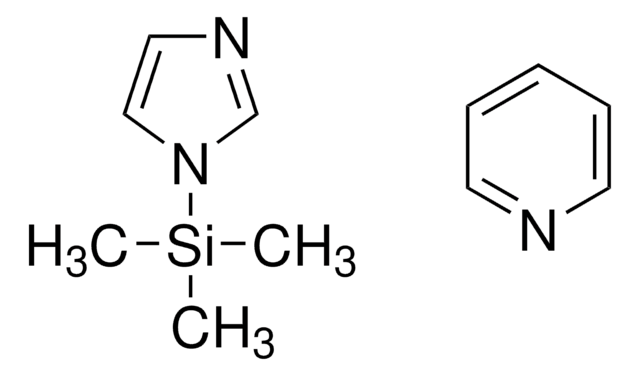394874
1-(Trimethylsilyl)imidazole
for GC derivatization, LiChropur™
Synonym(s):
TSIM, N-Trimethylsilylimidazole, TMSI
About This Item
Recommended Products
grade
for GC derivatization
Quality Level
Assay
≥94.0%
quality
LiChropur™
reaction suitability
reagent type: derivatization reagent
reaction type: Silylations
technique(s)
gas chromatography (GC): suitable
refractive index
n20/D 1.475 (lit.)
bp
93-94 °C/14 mmHg (lit.)
density
0.956 g/mL at 25 °C (lit.)
SMILES string
C[Si](C)(C)n1ccnc1
InChI
1S/C6H12N2Si/c1-9(2,3)8-5-4-7-6-8/h4-6H,1-3H3
InChI key
YKFRUJSEPGHZFJ-UHFFFAOYSA-N
Looking for similar products? Visit Product Comparison Guide
General description
Application
Other Notes
Legal Information
accessory
related product
Signal Word
Danger
Hazard Statements
Precautionary Statements
Hazard Classifications
Acute Tox. 4 Oral - Eye Irrit. 2 - Flam. Liq. 2 - Skin Irrit. 2
Storage Class Code
3 - Flammable liquids
WGK
WGK 3
Flash Point(F)
42.8 °F - closed cup
Flash Point(C)
6 °C - closed cup
Personal Protective Equipment
Choose from one of the most recent versions:
Already Own This Product?
Find documentation for the products that you have recently purchased in the Document Library.
Customers Also Viewed
Articles
Results of a study involving the ability few Fluka silylating reagents to form GC-MS-compatible trimethylsilylmethyl derivatives of NSAIDs
Results of a study involving the ability few Fluka silylating reagents to form GC-MS-compatible trimethylsilylmethyl derivatives of NSAIDs
Results of a study involving the ability few Fluka silylating reagents to form GC-MS-compatible trimethylsilylmethyl derivatives of NSAIDs
Results of a study involving the ability few Fluka silylating reagents to form GC-MS-compatible trimethylsilylmethyl derivatives of NSAIDs
Our team of scientists has experience in all areas of research including Life Science, Material Science, Chemical Synthesis, Chromatography, Analytical and many others.
Contact Technical Service










